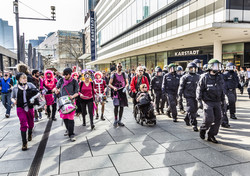Smarter social activism for a better world
In recent years, social activism such as the Occupy movement or the Arab Spring has been bringing profound social change with it and reshaping the geopolitical landscape. To increase our understanding on the topic, the EU-funded TMFOA (The moral foundations of activism) project investigated the role of moral conviction in collective action, particularly cooperative effort towards social change. While current research suggests that strong collective action emerges from a politicisation process where people identify with a social movement and its values, TMFOA advanced and tested its own theories on the topic. It examined the reasons behind higher levels of collective action readiness among the politicized and potential for friction. The research also suggested that holding a moral conviction in support of a collective cause could lead people to justify the use of violence in pursuit of this cause. The project found that some of its suggestions or predictions were more valid than others. It noted a strong relationship between the level of politicised collective identification and the extent to which individuals held a moral conviction in support of the collective cause. Researchers also found that politicised collective identification and moral conviction both affected willingness to engage in collective action. They concluded that politicised individuals respond negatively to those less committed to the collective cause, considering as well the role of moral convictions in the equation. This showed that moral convictions to support a collective cause encourage hostile collective action, underlining the importance of considering the moral aspects of activism. Moreover, providing protesters with effective peaceful means to further their goals diminishes their support for hostile collective action. In addition the research team developed a tool to measure the extent to which individuals see a reliance on rational means in the formation and evaluation of belief as a moral issue. It also investigated differences between religious and nonreligious individuals in moralising rationality, as well as the consequences of such differences. Importantly, the research results showed stronger moralisation of rational processes of belief formation and evaluation among the nonreligious than the religious. It explained why the nonreligious responded more negatively to violations of rationality than the religious. These results can be crucial in advancing more peaceful social change.







